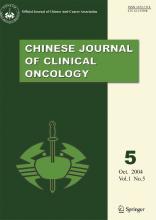Abstract
OBJECTIVE To investigate the influence of positive lymph nodes on the prognosis for patients with stage Ib—Ilb cervical carcinoma.
METHODS Sixty-six patients with stage lb-llb cervical carcinoma who underwent a radical hysterectomy and pelvic lymphadenectomy were analyzed retrospectively. The potential prognostic factors were calculated by the Cox proportional hazard model.
RESULTS The 5-year survival of the patients with pelvic lymph node metastasis was 40.7%. The Cox proportional hazard model analysis showed that cellular differentiation, the number of positive nodes and adjuvant therapy were independent prognostic factors (P<0.05). The 5-year survival of patients with 1 positive node was higher than that of those with 2 or more positive nodes (56.5% vs 36.4%, P<0.05). The distant metastasis rate in the former group (5.9%) was lower than the latter’s (32.7%) (P=0.05). However, there was no significant difference of pelvic recurrence between the 2 groups (P>0.05). The 5-year survival of the patients who had no adjuvant therapy (12.6%) was much lower than that (53.7%) of those with adjuvant therapy (P<0.05). However, there no obvious differences among the effect of adjuvant radiotherapy, chemotherapy and chemoradiotherapy (P >0.05).
CONCLUSION The prognosis of patients with stage lb-llb node-positive cervical carcinoma who underwent radical surgery was poor. Adjuvant therapy can increase the survival rate, decrease the pelvic recurrence and distant metastasis.
keywords
- Received June 24, 2004.
- Accepted August 26, 2004.
- Copyright © 2004 by Tianjin Medical University Cancer Institute & Hospital and Springer











